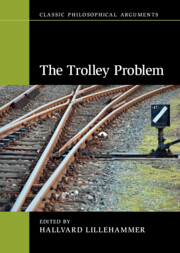Book contents
- The Trolley Problem
- Classic Philosophical Arguments
- The Trolley Problem
- Copyright page
- Contents
- Tables
- Contributors
- Acknowledgments
- Introduction
- 1 Keeping track of your trolleys
- 2 Shunted trolleys and other diversions
- 3 Must we turn the trolley?
- 4 Non-consequentialism in light of the trolley problem
- 5 Non-consequentialist principles under conditions of uncertainty
- 6 The trolley problem and the doing/allowing distinction
- 7 Virtue ethics and the trolley problem
- 8 Trolley dilemmas from the philosopher’s armchair to the psychologist’s lab
- 9 Trolleyology
- 10 Cross-cultural responses to trolley problems and their implications for moral philosophy or
- 11 Ethical accident algorithms for autonomous vehicles and the trolley problem
- 12 A new trolley problem?
- Bibliography
- Index
4 - Non-consequentialism in light of the trolley problem
Published online by Cambridge University Press: 24 February 2023
- The Trolley Problem
- Classic Philosophical Arguments
- The Trolley Problem
- Copyright page
- Contents
- Tables
- Contributors
- Acknowledgments
- Introduction
- 1 Keeping track of your trolleys
- 2 Shunted trolleys and other diversions
- 3 Must we turn the trolley?
- 4 Non-consequentialism in light of the trolley problem
- 5 Non-consequentialist principles under conditions of uncertainty
- 6 The trolley problem and the doing/allowing distinction
- 7 Virtue ethics and the trolley problem
- 8 Trolley dilemmas from the philosopher’s armchair to the psychologist’s lab
- 9 Trolleyology
- 10 Cross-cultural responses to trolley problems and their implications for moral philosophy or
- 11 Ethical accident algorithms for autonomous vehicles and the trolley problem
- 12 A new trolley problem?
- Bibliography
- Index
Summary
This chapter defends a non-consequentialist approach to justifying harming innocent nonthreatening people. The discussion centers on variations of cases where either a trolley driver or a bystander may redirect a trolley so that it kills one person, rather than five people towards whom it is headed. The article begins by critically examining other non-consequentialist proposals for why turning the trolley may be justified in both types of cases. It then defends seven principles, which together comprise the “Doctrine of Productive Purity” (DPP). The DPP implies that interpersonal harms may be justified by what produces them as opposed to by the goods they produce as in consequentialist views. The article contrasts the DPP with threshold deontology and considers how those whom one might permissibly harm may still permissibly resist such harm. The chapter concludes by considering limits of the DPP, the moral significance of the DPP for relations between people, and a new trolley problem that has implications for the killing/letting die distinction.
Keywords
Information
- Type
- Chapter
- Information
- The Trolley Problem , pp. 59 - 78Publisher: Cambridge University PressPrint publication year: 2023
Accessibility standard: Unknown
Why this information is here
This section outlines the accessibility features of this content - including support for screen readers, full keyboard navigation and high-contrast display options. This may not be relevant for you.Accessibility Information
- 1
- Cited by
